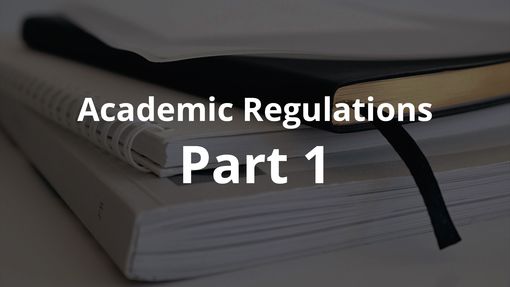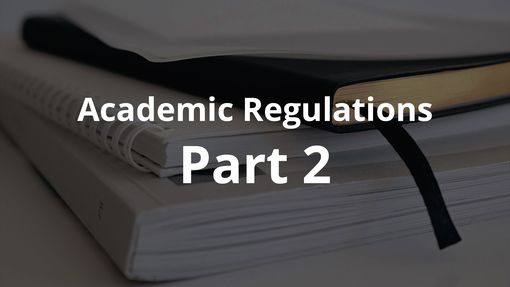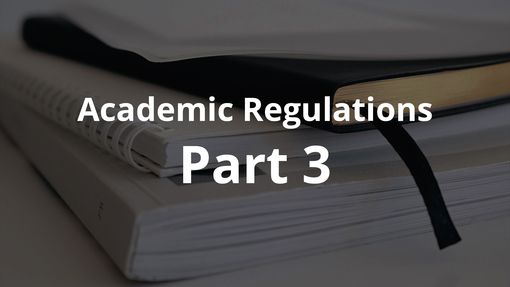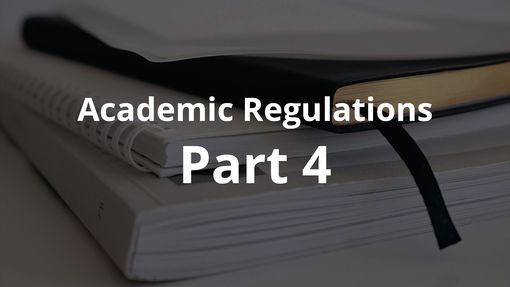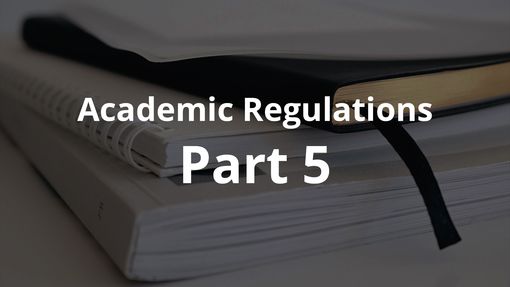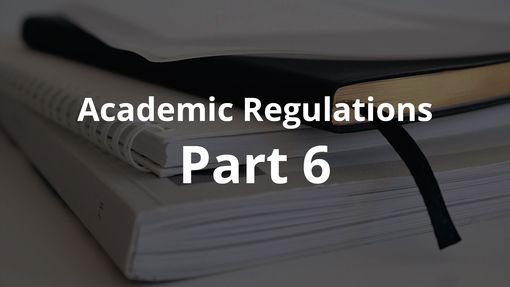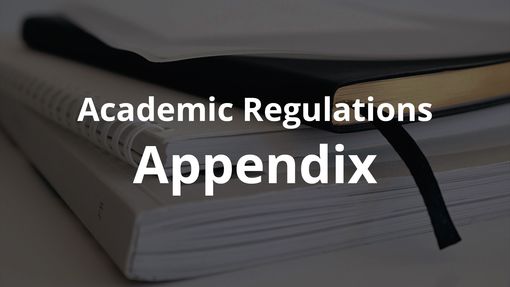Academic Regulations Part 5: The Conferment of Awards
Contents
29. Postgraduate Taught Awards
27. General
Award of Degrees
27.1 The School is authorised to confer First and Postgraduate Taught Degrees and Doctorates of the University of London on students registered as students of the School. This authority shall be exercised the Academic Board of the School.
27.2 No award will be given to any student who owes any outstanding tuition fees to the School. The Examination Board may consider the student’s results but any award will only be confirmed (via Chair’s action) once the debt has been cleared.
Field of Study
27.3 The field of study for an award will be stated in the Programme Specification and shall normally correspond to the name of the course e.g. Theatre Practice.
27.4 The field of study shall be descriptive of the units included in a degree curriculum but it shall be based only on a consideration of those units the examinations of which have been passed. The levels of pass are not relevant to the determination of the field of study.
Approved Course of Study
27.5 No award may be conferred on a student unless they are registered on an approved course of study with a named award.
27.6 The approved Programme Specifications will set out the units that must be passed by a student to achieve each named award. They will also set out if the award depends on the student satisfactorily completing a period of study outside the School, for example a work placement or period of study abroad and whether any credit can be awarded for successfully completing the period of study or for any assessment associated with it.
27.7 A Board of Examiners will confirm the title of the award in line with the student’s course of study and if applicable the pathway of study on the course.
27.8 A student may only be registered for one course (that leads to one of the named awards below) at any one time.
Interim Awards
27.9 The School does not make provision for interim awards. For example, a student registered on an Honours degree will not be awarded a Certificate in Higher Education and then a Diploma in Higher Education when as part of their Honours course the student has achieved the required number of credits for the sub-awards.
Awards and borderline classifications (class of Honours and pass, merit or distinction)
27.10 The Board of Examiners will not normally make any special consideration of borderline cases.
28. Undergraduate Awards
Award of a Certificate of Higher Education (Cert HE)
28.1 To qualify for the award of a Certificate of Higher Education, a student must have: a) passed units totaling at least 120 credits at Credit Level 4 or above; or b) satisfied any specific subject or scheme requirements for the named award.
28.2 The School may award a Certificate of Higher Education with Distinction to a student whose weighted average unit result is at least 70% across the credits passed (not including pass/fail units).
Award of a Diploma of Higher Education (Dip HE)
28.3 To qualify for the award of a Diploma of Higher Education, a student must have: a) passed units worth at least 240 credits, at Credit Level 4 or above in total, b) which must include at least 120 credits passed at Credit Level 5 (I) or above; c) satisfied any specific subject or scheme requirements for the named award.
28.4 The School may award a Diploma of Higher Education with distinction to a student whose weighted average unit result (not including units assessed as pass/fail only) is at least 70% across the credits passed at Credit Levels 5 or above.
Honours awards
Award of a Single Honours Degree
28.5 To qualify for the award of a Degree with Honours, a student must have: a) Been awarded at least 360 credits at Credit Level 4 (C) or above (including at least 240 credits at Credit Levels 5 (I) and 6 (H), of which at least 120 credits must be at Credit Level 6); b) satisfied any specific subject or scheme requirements for the named award.
Determination of Honours classification
28.6 The classification of Honours degree to be awarded shall be based on the overall degree mark. The overall degree mark shall be calculated through the combination of specified units at levels 5 and 6. The contribution of the units to the overall degree mark shall be in proportion to the credit size and 25% of the overall degree mark shall be derived from level 5 units with 75% being from level 6.15
15 Individual Programme Specifications for the period up to 2012 may vary this method
28.7 The School sets the class of Degree that may be awarded as follows:
| First | 70% or above for the overall degree mark |
| Upper Second | 60-69% or above for the overall degree mark |
| Lower Second | 50-59% or above for the overall degree mark |
| Third | 40-49% or above for the overall degree mark |
28.8 The final Degree classification agreed through the assessment process is based on academic judgement and the above calculation is only used as a guide.
28.9 Once a student has fulfilled the criteria for the Honours degree they may not undertake further units in order to improve their average result.
Award of a Pass classification (Unclassified/non-honours degree)
28.10 To qualify for the award of a Pass classification, a student must have: a) passed credits worth at least 300 credits at Credit Level 4 (C) or above including 60 credits at level 6 (H).16
16 As a result of variation in unit credit values, the credit requirement for the unclassified degree may exceed 300 credit points for some courses, but will be below 360 points.
29. Postgraduate Taught Awards
Award of a Postgraduate Certificate (PG Cert)
29.1 To qualify for the award of a postgraduate certificate in higher education a student must have passed units to the value of 60 credits at level 7.
Award of a Postgraduate Diploma (PG Dip)
29.2 To qualify for the award of a postgraduate diploma in higher education a student must have passed units to the value of 120 credits at credit level 7 (M).
Award of a Masters (MA)
29.3 To qualify for the award of Masters a student must have:
- Been awarded credit to the value of 180 credits at credit level 7 (M);
- no more than 60 credits from study at another institution.
29.4 The School classifies its awards at Postgraduate taught level (PG cert, PG Dip and Masters) as one of the following:
Distinction
The student has achieved a weighted result of 70% or above in units at Level 7 (M) with a mark of at least 60% in the sustained independent project (SIP).
Merit
The student has achieved a weighted result of between 60% and 69% in units at credit level 7 (M), with a mark of at least 60% in the sustained independent project.
Pass
The student has achieved a weighted result of between 50% and 59% in units at credit level 7 (M).
Award of a Master of Fine Art (MFA)
29.5 To qualify for the award of Master of Fine Art a student must have:
- been awarded credit to the value of 240 credits at credit level 7 (M);
- no more than 120 credits of accredited prior learning;
- studied a minimum of 120 credits comprising the second year of the programme.
29.6 The School classifies its award of Master of Fine Art as one of the following
Distinction
The student has achieved an average result of 70% or above in units at Level 7 (M) with a mark of at least 60% in the sustained independent project (SIP)
Merit
The student has achieved an average result of between 60% and 69% in units at credit level 7 (M), with a mark of at least 60% in the sustained independent project.
Pass
The student has achieved an average result of between 50% and 59% in units at credit level 7 (M).
30. Other Awards
Posthumous Awards
30.1 Any of the awards conferred by the School, may be conferred posthumously and accepted on the student’s behalf by a parent, spouse or other appropriate individual. The normal conditions of award must be satisfied and the award certificate will not refer to its having been conferred posthumously.
Aegrotat Awards
30.2 Aegrotat awards may be recommended only for the following qualifications: Certificate of Higher Education, Diploma of Higher Education, and honours degree. Aegrotat awards on Postgraduate courses are not permitted.
30.3 Aegrotat awards are not classified.
30.4 An aegrotat award will only be considered if a student has permanently withdrawn from the course and is unable to continue for the foreseeable future due to long-term illness.
30.5 An Aegrotat award may be recommended when the Examination Board does not have sufficient evidence of the student’s performance to recommend the award for which the student was a candidate, but is satisfied that but for the illness or other valid cause the student would have reached the standard required.
30.6 The Examination Board must offer a student the opportunity either to accept the Aegrotat award or resit as if for the first time the assessment units for which there was insufficient evidence of performance on which a judgement could be made.
30.7 If the student fails these assessments, then they may not claim the Aegrotat award.
30.8 An Aegrotat award may not be conferred on courses accredited by a professional body which does not sanction this form of award.
31. Post Examination Boards
Communication with students after the examination Board
31.1 No assessment results may be given to students by telephone. Normally, no assessment results may be given to students by e-mail. Exceptionally, results may be communicated to an e-mail address provided by the student to the Examinations Officer, usually when the student has left the UK and it is known that written communication may be slow or unreliable.
Result Letters
31.2 The Programmes Office will send a result letter, signed by the Academic Registrar or their nominee, to the following:
- Every student recommended for an award;
- Every student who has failed the course and is excluded. (Such a letter may also indicate that the student has been recommended for lower award within the same course of study. All such letters will advise the student of the Academic Appeals Procedures.)
Resit and Deferral Letters
31.3 In liaison with course Examinations Officers as appropriate, the Programmes Office will send letters to students to whom the Examination Board has offered resits or deferrals, specifying a date by which the task must be complete and where necessary referring the student to the appropriate member of Academic Staff for details of the assessment task.
Students Recommended to Progress to the Next Level of the Course
31.4 The Programmes Office will send a standard progression letter to all students eligible to progress to the next year of a course.
Students Not In Attendance, Deemed Withdrawn
31.5 Normally, withdrawals from a course should have been recorded in advance of the Examination Board. If, exceptionally, it is revealed at the Examination Board that a student has not attended or responded to correspondence, and has not presented evidence of mitigating circumstances, the Secretary to the Examination Board will write to the student, as agreed by the Board, normally advising the student that they have been deemed to have withdrawn from the course.
Award certificates
31.6 For all University of London Awards, certificates are issued directly by the University. For graduates who qualified previously for an Open University Award, certificates are distributed via the School’s Academic Records Office.
Change of Mark after a Board of Examiners
31.7 In the event that a mark or grade for any assessed work needs to be amended after the board of Examiners has convened and approved the marks and overall unit results, the amended mark and any resulting change in the overall unit result or (for finalists) degree classification must be approved by the Chair of the board (or nominee).17
31.8 The full range of sanctions outlined in the School’s Student Disciplinary Procedures may be applied retrospectively if evidence of an assessment offence is produced after a mark has been awarded.
17 Markers and Chairs of-boards in conjunction with Programmes Office should consider for any continuing student whether the change in overall unit result has any effect on their progression status. Operational Note: The student shall be informed of the mark amendment and any resulting change to their progression, degree or degree classification in writing by the Programmes Office.
Revocation of degrees
31.9 The Academic Board may revoke any degree, diploma or certificate granted by the School and all privileges connected therewith, if it shall be discovered at any time and proved to the satisfaction of the School that: a) there was an administrative error in the award made under the relevant procedures; or b) subsequent to the award, a Board of Examiners, having taken into account information which was unavailable at the time its decision was made, determines that a candidate’s classification should be altered or award rescinded; or c) a student who has previously been awarded an exit award subsequently reenrols on and successfully completes a higher qualification (refer to paragraphs 2.27 and 2.28 in the General Regulations).

